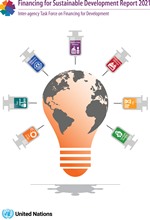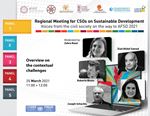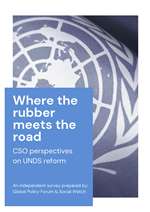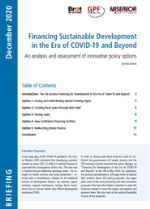Social Watch News
Published on Tue, 2021-04-06 14:14
In the lead-up to the UN’s Financing for Development Forum that takes place virtually from April 12-15, the 2021 edition of the Financing for Sustainable Development Report has been released. The report is published by the so-called Inter-Agency Task Force (IATF), which comprises numerous UN entities, but also the International Monetary Fund, the World Bank and the World Trade Organization. It is widely considered the most comprehensive source of data and analysis on development finance topics. |
Published on Thu, 2021-03-25 00:00
The video of the virtual Campaign Activation Workshop “Making the 2030 Agenda accountable: What is the role for civil society?” is now online. The virtual workshop was co-organized by Global Policy Forum, Global Policy Watch and Social Watch as part of the 2021 SDG Global Festival of Action and it was held on March 25, 2021. |
Published on Wed, 2021-03-24 12:03
Invitation to attend The Regional Meeting for CSOs on Sustainable Development in the Arab Region. Representatives of civil society and experts in Arab countries will discuss efforts to achieve sustainable development in the Arab region and the challenges it faces. The meeting will propose practical recommendations at the level of public policies to be submitted to the Arab Forum on Sustainable Development and through it to the High-level Political Forum to be held in July 2021 in New York. |
Published on Thu, 2021-03-18 11:02
The promise of the SDGs makes governments accountable but who is to be made responsible for global issues like the climate, the pandemic or finances? Join us to discuss this issue in a workshop hosted by Global Policy Forum, Global Policy Watch and Social Watch as part of the 2021 SDG Global Festival of Action. The workshop will be held on March 25, 2021 from 04:30 to 05:30 PM (CET). |
Published on Fri, 2021-02-19 14:13
The demands and urgency of addressing COVID-19 related issues have been added to the already crowded United Nations agenda, with consideration and intensity shifting up and down on the scale of priorities. |
Published on Thu, 2021-02-18 22:20
The United Nations and Member States begin the 2021 calendar confronted with the need to address the ongoing COVID-19 crisis and growing global inequalities. Despite the WHO’s efforts to make the COVID-19 vaccine “affordable and accessible for all” through the ACT Accelerator and calls by CSOs and UN leadership and world leaders for a People’s Vaccine (a global public good free from Intellectual Property Rights), the global vaccine distribution/rollout has been dominated by wealthy, developed countries, with little if any vaccines available for small and medium developing countries. |
Published on Mon, 2021-02-01 14:24
A survey among CSOs in “programme countries” evidences a very high level of commitment to UN values and principles, much dissatisfaction with the actual operations at country level and articulation of areas for improvement. For a number of CSOs, the UN system is appreciated for its inspiration, legitimization and promotion of the values they stand for, but is also viewed as a competitor for funds and influence, often displacing the social sector instead of building it. And frequently it is seen as both at the same time. |
Published on Wed, 2020-12-09 13:35
An analysis and assessment of innovative policy options In the early days of the COVID-19 pandemic, the United Nations (UN) estimated that developing countries needed an extra US$ 2.5 trillion in external finance to cope with the consequences of the crisis. This vast sum is needed because additional spending needs – for example on health services and social protection – coincide with a simultaneous collapse of all traditional sources of development finance: tax revenue, export earnings, migrant remittances, foreign direct investment and, to a lesser extent, also official development assistance (ODA). In order to discuss how these finances could be mobilized, the governments of Canada, Jamaica and the UN Secretary-General launched the policy dialogue on “Financing for Development in the Era of COVID-19 and Beyond” at the UN in May 2020. |
Published on Thu, 2020-12-03 19:54
The General Assembly (GA) will host its 31st Special session in response to the coronavirus disease (COVID-19) pandemic on 3 and 4 December 2020. The UN Charter (Chapter IV, article 20) provides for the General Assembly to meet in special sessions which can be "convoked by the Secretary-General at the request of the Security Council or of a majority of the Members of the United Nations." UN special sessions are unusual, this will be 31st in the life of the UN and only the sixth since 2000. As the COVID-19 pandemic’s widespread effects range across development, peace, security, and socioeconomic affairs, there is no doubt about the special measures that the global community must address to confront the global pandemic. |
Published on Wed, 2020-12-02 00:00
The COVID-19 pandemic has resulted in the Least Developed Countries (LDCs) this year experiencing their worst economic performance in 30 years, the United Nations Conference on Trade and Development (UNCTAD) has said. In its Least Developed Countries Report 2020, released on 3 December, UNCTAD said that while the pandemic had (at least initially) a less-than-catastrophic health impact on the LDCs, its economic repercussions have been ruinous. In 2020, the COVID-19 pandemic led to LDC economies experiencing their strongest economic shock in several decades. |
SUSCRIBE TO OUR NEWSLETTER










